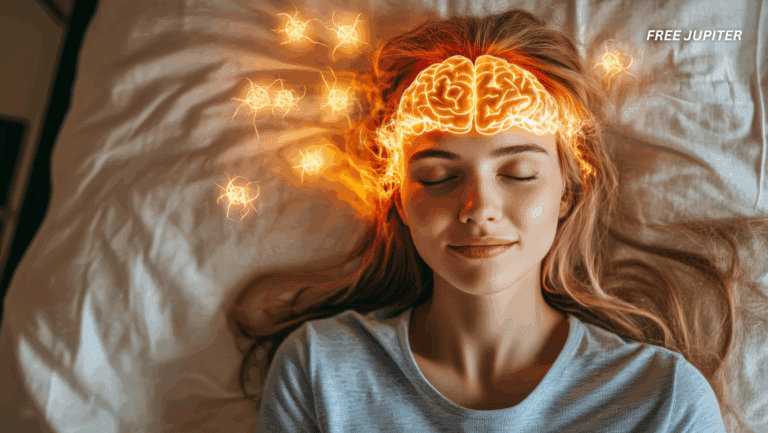Friendly Note: FreeJupiter.com shares general info for curious minds 🌟 Please fact-check all claims—and always check health matters with a professional 💙
Every night while you sleep, your brain gets busy, not with dreams of talking dogs or flying taxis (although that too), but with serious maintenance work. You can think of sleep as your brain’s version of closing down a supermarket to mop the floors, stock the shelves, and throw out expired milk.
Behind the scenes, a group of cells called glial cells are hard at work. These unsung heroes are like your brain’s sanitation department. Among them are:
- Astrocytes – which act like quality control managers. They prune away old or unused synaptic connections (think of trimming back overgrown branches).
- Microglia – which serve as your brain’s immune defense, cleaning up cellular debris, damaged neurons, and other messes that could spell trouble if left behind.
Under normal, well-rested circumstances, this brain cleaning is vital. It helps memory, learning, and emotional balance. But if you consistently deprive yourself of sleep, things begin to go very wrong.
🧨 The Brain Goes Into Overdrive When You’re Sleep-Deprived
Recent research using mice found that chronic sleep deprivation flips a switch in the brain’s internal housekeeping system. Instead of casually tidying up, these glial cells go into full demolition mode.
In the study, mice that were kept awake for long periods showed a dramatic increase in astrocyte activity. These cells began not just cleaning up old or damaged synapses—but actively breaking down healthy, functional brain connections. That’s like your housekeeper deciding your couch is clutter and tossing it in the dumpster.
Even more concerning, the microglia—those powerful immune cells—also became unusually aggressive. While they’re essential in small doses, prolonged activation can lead to chronic inflammation and is a known factor in neurodegenerative diseases like Alzheimer’s.
Read more: According to Sleep Experts, Changing This One Afternoon Habit Can Help You Sleep Better
🧩 Why Is This Happening?
Well, the brain sees sleep deprivation as a form of stress. And stress, biologically speaking, always triggers some kind of emergency protocol. In this case, the brain seems to think it’s in trouble, so it starts cleaning house—hard.
The most affected areas? Large, mature synapses—the ones that are used most frequently. That’s alarming because these aren’t obsolete or weak. They’re your brain’s top performers—the MVPs of memory, learning, and processing power. And yet, in sleep-deprived states, your brain treats them like clutter and begins to dismantle them.
It’s like burning the library’s most popular books because you didn’t have time to organize the shelves.
🧬 Can This Be Reversed?
One big unknown: is this damage permanent? So far, scientists haven’t confirmed whether the brain can fully bounce back after chronic sleep loss. While a few good nights of sleep may help calm the glial storm, there’s no guarantee all the lost connections will be restored.
Think of it like pulling a weed—you can stop it from growing more, but the damage to nearby flowers may already be done.
🧠 Sleep: The Ultimate Brain Health Hack
Now let’s zoom out. Why is sleep such a big deal anyway?
Sleep isn’t just rest. It’s repair. During different stages of the sleep cycle—especially slow-wave sleep and REM (rapid eye movement) sleep—your brain carries out all sorts of tasks crucial for mental and physical wellbeing:
- Memory consolidation: Your brain decides what to keep and what to toss, strengthening important memories and learning from the day.
- Emotional regulation: That’s why everything feels harder, more annoying, or downright hopeless when you’re tired.
- Detoxification: The glymphatic system (the brain’s version of the lymphatic system) kicks into high gear during sleep, clearing out harmful waste proteins.
- Neuroplasticity: Your brain adapts to new experiences, strengthens useful connections, and prunes what’s unnecessary.
Without sleep, your brain doesn’t just work less effectively—it starts to fall apart, quite literally.
Read more: Your Brain Is Still Feeling the Impact Of The Sleep You Got Two Weeks Ago, Science Says
🧓 The Dementia Connection
Here’s where things get even more alarming. Excessive microglial activation—the same one triggered by sleep deprivation—has been observed in brains with Alzheimer’s disease, Parkinson’s disease, and other forms of dementia.
In Alzheimer’s, for example, the brain accumulates amyloid-beta plaques, sticky protein clumps that interfere with memory and communication. Normally, the glymphatic system helps clear these away. But this system mostly functions during sleep.
So, what happens if you don’t get enough sleep over time?
You guessed it: these toxic proteins pile up. And with microglia in attack mode, brain tissue can become chronically inflamed and damaged—further accelerating the progression toward cognitive decline.
In fact, studies have shown that people who consistently sleep less than six hours a night in midlife are at significantly higher risk of developing dementia later in life.
😴 Why Modern Life Is a Sleep Thief
Let’s be honest—sleep often gets sacrificed first in our never-ending to-do lists. Between late-night emails, binge-worthy shows, and the doom-scroll of social media, most people are chronically underslept. Add in stress, anxiety, and round-the-clock digital distractions, and the average adult is getting far less rest than their brain truly needs.
And let’s not forget cultural attitudes. Bragging about how little sleep you get is still bizarrely seen as a sign of productivity or toughness, especially in fast-paced industries. But neuroscience is clear: sleep is not a weakness. It’s a superpower.
💥 The Domino Effect on Your Whole Body
Sleep isn’t just a brain thing—it affects almost every system in your body.
Sleep deprivation can:
- Disrupt hormones that regulate hunger (ghrelin and leptin), making you crave high-calorie foods
- Weaken the immune system, increasing your risk of infection
- Raise your blood pressure and risk of heart disease
- Increase stress hormones like cortisol
- Contribute to insulin resistance, a key factor in type 2 diabetes
So if you’re struggling to manage weight, feel constantly anxious, or get sick easily, your sleep—or lack thereof—might be a key culprit.
🧘♂️ Sleep as Therapy
Ironically, sleep is one of the most accessible and effective health interventions we have. It’s free. It’s natural. And it requires no prescription.
But improving sleep isn’t just about going to bed earlier. It’s about sleep hygiene:
- Keep a consistent bedtime and wake time, even on weekends
- Avoid screens at least an hour before bed—blue light suppresses melatonin
- Cut caffeine after 2 PM
- Make your bedroom cool, dark, and quiet
- Develop calming pre-bed rituals like reading, journaling, or breathing exercises
Even short-term improvements in sleep can lead to noticeable changes in mood, focus, and overall vitality.
🔁 The Takeaway: Sleep Is a Full-Body Reset Button
Your brain is a beautifully complex organ with billions of connections working in harmony to help you think, feel, and experience life. But without enough sleep, its systems start to backfire—sometimes in ways that are hard to undo.
When you’re sleep-deprived, you’re not just groggy or grumpy—your brain’s immune system literally starts breaking down your mental infrastructure. And the longer it goes on, the more likely you are to face memory issues, emotional instability, and increased risk of neurological disease.
So the next time you’re tempted to pull an all-nighter or “power through” on four hours of rest, remember: your brain’s doing much more than lying still during sleep.
It’s cleaning, restoring, and rebuilding the very circuits that make you you.
Read more: Insomnia Isn’t Just About Sleep, Your Personality Plays a Huge Role
🌟 Final Quirky Thought:
If your brain had a union, it would probably go on strike after three nights of bad sleep. Don’t let that happen. Give it what it needs: rest, recovery, and a solid eight hours in dreamland.
You’re not being lazy—you’re doing high-level neurological maintenance. Sweet dreams!
Disclaimer: The information in this article is for general informational purposes only and is not medical advice. We are not doctors, and this website is run as a family hobby project. Always consult a qualified healthcare professional before making decisions about your health. Please fact-check any claims and use this content as a starting point, not a substitute for professional guidance.










